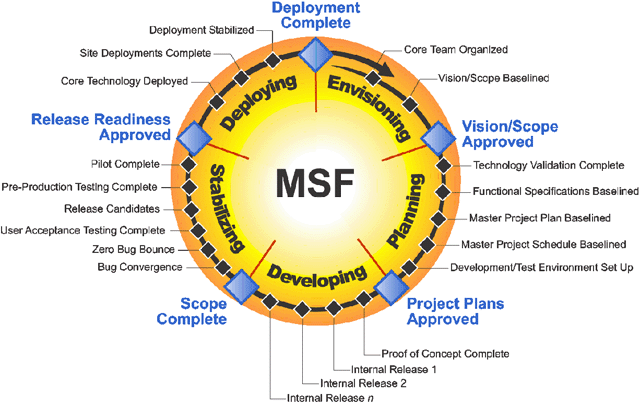About Microsoft Solutions Framework (MSF)
Creating meaningful business solutions on time and within budget requires a proven approach. Microsoft Solutions Framework provides an adaptable framework for successfully delivering information technology solutions faster, requiring fewer people, and involving less risk, while enabling higher quality results. MSF helps teams directly address the most common causes of technology project failure in order to improve success rates, solution quality, and business impact. Created to deal with the dynamic nature of technology projects and environments, MSF fosters the ability to adapt to continual change within the course of a project. MSF is called a framework instead of a methodology for specific reasons. As opposed to a prescriptive methodology, MSF provides a flexible and scalable framework that can be adapted to meet the needs of any project (regardless of size or complexity) to plan, build, and deploy business-driven technology solutions. The MSF philosophy holds that there is no single structure or process that optimally applies to the requirements and environments for all projects. It recognizes that, nonetheless, the need for guidance exists. As a framework, MSF provides this guidance without imposing so much prescriptive detail that its use is limited to a narrow range of project scenarios. MSF components can be applied individually or collectively to improve success rates for the following types of projects
- Software development projects, including mobile, Web and e-commerce applications, Web services, mainframe, and n-tier.
- Infrastructure deployment projects, including desktop deployments, operating system upgrades, enterprise messaging deployments, and configuration and operations management systems deployments
- Packaged application integration projects, including personal productivity suites, enterprise resource planning (ERP), and enterprise project management solutions.
- Any complex combination of the above.
MSF guidance for these different project types focuses on managing the “people and process” as well as the technology elements that most projects encounter. Because the needs and practices of technology teams are constantly evolving, the materials gathered into MSF are continually changing and expanding to keep pace. Additionally, MSF interacts with Microsoft Operations Framework (MOF) to provide a smooth transition to the operational environment, which is a requirement for long-term project success.
The process model summarizes the MSF process flow

